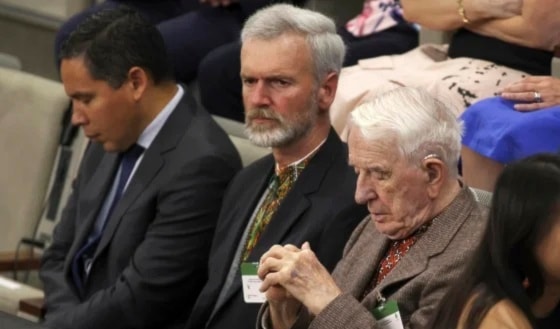Canada publishing Nazi list would aid 'Russian propaganda': Ukraine
The list in question is composed of 900 names of Nazis residing in Canada gathered by a 1986 war crimes commission.
-

Yaroslav Hunka, right, was honored in the House of Commons in Ottawa, Ontario, on September 22, 2023. (AP)
The Library and Archives Canada (LAC) has received several requests advising against disclosing the names of 900 alleged Nazis residing in the country, compiled by a 1986 war crimes commission.
The Canadian institution decided to hold off on the list's publication after consulting with "multiple stakeholders" in fear of aiding in "Russian propaganda" against Ukraine.
The stakeholders expressed concerns about the implications of “associating Ukrainian names with Nazis,” asserting it would justify Russia's military operation in Ukraine, The Globe and Mail reported, citing a LAC report.
The Canadian newspaper is one of the organizations urging the LAC to release the names.
The LAC was reportedly informed that Moscow could use the list to “further these allegations or conduct disinformation campaigns in Canada,” potentially affecting Kiev's public support during its ongoing war with Russia.
Stakeholders debate on disclosing the list
“A few stakeholders were concerned that the release of the report would result in new legal action (criminal prosecution, citizen revocation, or otherwise) being brought against the individuals named in the report,” according to a LAC memo released by the Ottawa Citizen on Wednesday.
One of the possible stakeholders for the national library may include the Ukrainian Canadian Congress, whose CEO told The Globe and Mail that the list should "remain confidential," while adding that individuals guilty of committing war crimes should be prosecuted.
“It looks like the government is placing the wishes of war criminals over and above the rights of Canadians to know the truth about terrible crimes committed by those who have quietly lived among us for so many years,” Jaime Kirzner-Roberts, the senior director of Friends of Simon Wiesenthal Center for Holocaust Studies said, after the center was excluded from consultations.
Revealing the names would be "the ethical thing to do," Per Anders Rudling, a historian at Sweden's Lund University who has conducted research on Ukrainian SS veterans in Canada.
Names on the list
Among those included on the list of allegedly Nazis living in Canada after World War II were members of the 14th Waffen-SS Grenadier Division ‘Galizien’, composed of ethnic Ukrainians.
During a speech by Ukrainian leader Zelensky in a speech in Canada's parliament in September last year, 98-year-old former Nazi Ukrainian soldier, Yaroslav Hunka, who had served in a Waffen-SS division during WWII, received a standing ovation from the Canadian Parliament.
Canada's speaker of the House of Commons for the lower chamber Anthony Rota, announced his resignation just a few days after he faced criticism for publicly praising the former Nazi, something Russia called outrageous.
Canadian Prime Minister Justin Trudeau issued an apology after the incident, with the parliamentary speaker resigning from the controversy.
After the Canadian parliament gave a standing ovation to the former Nazi veteran, calls were made back in September 2023 to remove a monument in a Canadian cemetery that honors his unit.
The Globe and Mail reported that the LAC intended to publish the list later this month, but had to postpone the process due to a pending “full review in accordance with the Access to Information Act and the Privacy Act."
Trudeau also apologized, calling the blunder "deeply embarrassing."

 3 Min Read
3 Min Read









